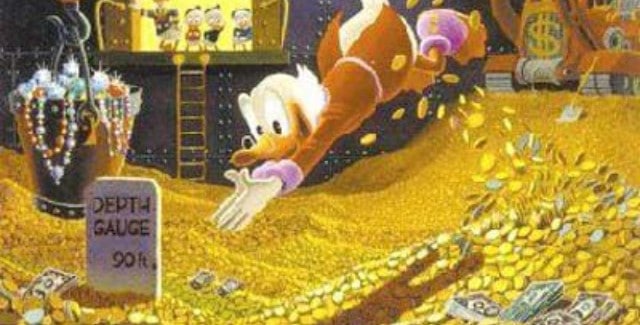[SPOILER WARNING: This article contains plot twists from the finale.]
It’s the end of an era.
Breaking Bad capped its five-season run (or six, depending on how you see it) this past Sunday, bringing a gently apocalyptic conclusion to perhaps the most important show on television. Advertisers were reportedly charged up to $400,000 for a 30-second slot during the finale, which added to a long list of ratings records.
Walter White is dead, but the TV show he epitomized will live on as perhaps the greatest accomplishment of the American Movie Channel. Perhaps the irony was intentional.
Creator Vince Gilligan drew us into Breaking Bad’s sun-baked world of meth and moral ambiguities with a deeply developed cast to take us along for the ride. It gave its main character, Walter White, a character arc like we’ve never seen: it showed us a man who did bad things for a good reason, made us love him, then slowly turned him into a villain and made us despise him.
In the first season, America was on Team Walt. By “Felina,” if you were still on Team Walt you were a sociopath.
And Bryan Cranston’s character wasn’t the only thing going for this show by any means. The writing, acting, detail, setting, mood and all the other intangibles that make a TV show great were always there in Breaking Bad, with superior depth and consistency every time.
With the possible exception of season three’s lethargic “Fly” episode, each episode had a cinematic crispness and immersion that took us into another world like nothing else on TV. Any show that can turn a 50-year-old high school chemistry teacher into a cultural icon is something to behold.
While every TV show wrestles with morality at some level, Breaking Bad did it beautifully. It showed us that actions have consequences, our decisions affect those we love, and noble intentions do not an upright drug dealer make.
Even though Walt, a cancer-stricken husband and father of two, took the chance to provide his family financial security for decades after his passing, the inherent evil of how he did it, and the ways it destroyed him, outweighed any noble motives he had.
If money and power only amplify who a person already is, Walter White was a firsthand experiment in corruption. Even though Walt never inhaled a whiff of the countless pounds of meth he produced, the money and power that came from it proved to be the most lethal drug of all.
As he admits to his wife, Skyler, in the final episode, he manufactured meth and made millions ultimately for himself, because he loved it and it made him feel “alive.”
The show’s final scene shows Walt in a meth lab, affectionately eyeing the equipment he used to build his empire. In his final moment, he sets his hand, tears in his eyes, on a metal mixing container and collapses to his death, leaving a bloody handprint behind.
This was a subtle nod to the theory that “Felina” was an acronym for the elements Fe (iron), Li (lithium) and Na (sodium), which represent blood, meth, and tears, respectively. A triple entendre including as well an anagram for “finale” and a reference to Marty Robbins’ “El Paso” (a song about a man who chases a woman named Felina despite the risk of death), which plays at the beginning of the finale, certainly wouldn’t be past Vince Gilligan’s creative scope.
Breaking Bad’s finale was better than fantastic. It was fitting. It made sense. It didn’t leave any loose ends like The Sopranos or Lost, and even if it didn’t have any mind-bending twists, it didn’t need to (although I doubt anyone saw the Gretchen-and-Elliot and the gun-in-the-trunk twists coming). It was straightforward, contemplative and just unpredictable enough to deserve classic status.
For a show as deep as Breaking Bad, I sure wouldn’t want to have had the responsibility of wrapping it up, and Gilligan and the writers did as well a job as anyone could have. You have to respect a creative team who has the determination to wrap up a show when it feels right it even though it’s beginning to explode in popularity (cough, Dexter, cough).
To add to the show’s universe of ironies, it decided to resolve its winding moral ambiguity (Is it alright to commit a crime to save one’s family? Is it alright to temporarily poison a child in order to indirectly save a life?) with a few strong, morally absolute undertones.
It left us with a few truths. One of which is that crime doesn’t pay. Walt lost everything, including his family, and everyone connected to Walt was killed or had their life altered irreparably.
For a show centered on the meth industry and the money and power it can bring, Breaking Bad didn’t glamorize it or take the “we-know-it’s-bad-but-it’s-cool” route. It showed us the consequences of sin, showed the heart’s capacity for evil, and punished that evil with ever-so-poetic justice. Jesse’s hysterics as he drove into the desert night indicated that he was hardly free.
Although it would be a massive stretch to call this show a “Christian” show (what would that mean, anyway?), it pressed the issues of right and wrong with more clarity and force than any other show on mainstream television. More specifically, it showed us how the human heart can change.
Walt’s statement to his chemistry class in episode one was a poignant foreshadowing of his demise: “What is chemistry? It’s the study of change.” The show watched sin, pride, greed and selfishness quickly change Walt from a kind-hearted, suburban father to a wicked and murderous drug lord. It showed us that sin affects us and infects us all, and no one is immune.
The human heart always swings in the direction of sin if left unchecked, and there’s no limit to how bad we can become. It’s as if the show was saying to us, “If it can happen to Walter White, it can happen to anyone.”
Thank God for a redeemer.






















